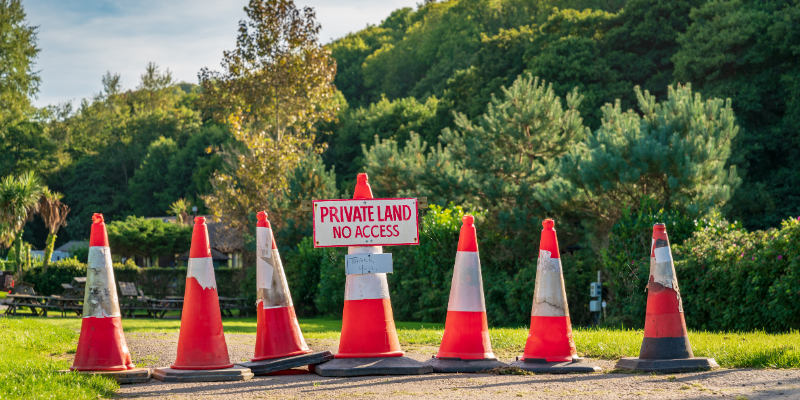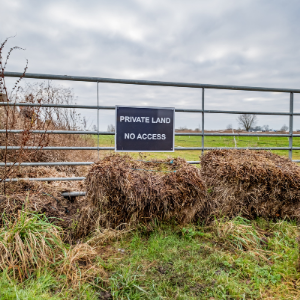
Understanding Legal Access to Land in North Carolina
Understanding bounded properties is crucial for existing proprietors and intending purchasers in North Carolina. A bounded lot, prevalent in the state, refers to real estate lacking direct access to public highways. Such properties can pose significant usability and valuation challenges.
The legal options available under state law to address bounded lots include easement by necessity, prescriptive easements, and negotiated agreements with adjacent landowners. Property owners create easements when they can only access their land through another person’s property, typically during the subdivision of larger lots.
In North Carolina, a claimant can claim a prescriptive easement after unrestricted use of a way through their land, typically lasting 20 years. Moreover, directly contracting nearby landowners to form easement agreements can also be mutually beneficial.
Experts in real estate law will outline all possible alternatives that grant access within the law and circumvent conflicts that may arise because of North Carolina rules.
Navigating Property Rights and Easements in NC Real Estate

Navigating property rights and easements in North Carolina real estate, exploring property rights and easements in North Carolina real estate includes mastering state-specific laws and legal applications. Here, landlocked property owners may form an easement, either by necessity or prescription, to access their property.
An easement by necessity arises when one lot is surrounded by other lots, preventing access to highways. Such access persists only when the parcel separates from the parent tract without explicit intent.
Prescriptive easement claims, on the other hand, are pieces of land adjacent to other properties with a path going through them. If this path is used continuously and openly over a period, which is usually twenty years in North Carolina, it may be used freely and without restrictions. Property owners often face many difficulties proving these claims; consulting an attorney specializing in North Carolina real estate law is essential to handle these intricate matters.
Knowing how to build real easements adds tremendous value to managing property rights and granting lawful access to landlocked real estate in the area.
The Importance of Legal Access in Buying and Selling Land
Acquiring land access legally becomes essential when dealing with landlocked real estate in North Carolina. Legal access pertains to a right-of-access easement that allows landowners to reach their land through a public road or via neighboring parcels through easements over them.
Without legal access, steep discounts would burden the value of such lands, making securing financing challenging. In North Carolina, state provisions permit the creation of easements through agreements or, if necessary, court actions.
Potential land buyers need to review existing easements and consult a realtor to guarantee that all documents filed are in order. To eliminate running post-sale litigations due to false disclosure claims, sellers need to provide all positives and negatives concerning no access issues upfront.
Landlocked lots’ real estate transactions may need a targeted approach to navigate zoning bylaws and local government regulations effectively. Buffered parcels with indisputable legal access improve market appeal alongside investment value for clients doing such transactions, and sheltering property rights guarantees all in such deals.
How to Determine Legal Access for Your North Carolina Property
In North Carolina, you must understand easements and rights-of-way to determine legal access for landlocked properties. You must also perform a title search to see if easements grant access to a public road or if another property exists.
North Carolina law allows obtaining an easement by necessity if the landlocked portion of your property used to be part of a bigger parcel with access to a road. You must show that not having access significantly diminishes the property’s value or impairs its use.
An expert in North Carolina real estate law can assist you in acquiring an explicit easement from neighboring landowners, meaning precise legal access can be granted through formal agreements. Moreover, these laws and legal boundaries can shape how access to the property will be determined and legally established, so it’s essential to know statutory law and local zoning rules.
Challenges of Selling Land Without Legal Access in North Carolina
Selling landlocked real estate in North Carolina comes with various issues, like a lack of legal access. Landlocked properties often face the most difficulty due to the lack of public roads or access points—potential buyers are always wary of investing in property with no legal ways of entering and exiting.
The absence of legal access significantly lowers landlocked properties’ market value and appeal. Furthermore, navigating the complex system of easements requires meticulous steps. Legal easements from neighboring property owners can be challenging, often requiring negotiation and sometimes even litigation.
Zoning rules and bylaws also present a further obstacle to sellers explaining access rights. Every state, including North Carolina, has specific regulations on acquiring an easement by necessity or prescription, complicating the sales process.
It is crucial to have real estate experts who understand these regulations and can advise sellers on the legal documents required for access.
Fortunately, Fast Land Offers buys land for cash in North Carolina, helping property owners skip the stress and legal hassle of selling land without legal access in .
Exploring Easement Laws: What NC Landowners Need to Know
Easement regulations are critical for unlocked holdings in North Carolina. They establish the accessibility of remote properties, thereby guiding the sale of landlocked real estate. Landowners should note that North Carolina has unique easements, such as prescriptive and necessity easements.
The prescriptive easement is the right to use another’s property because of continuous use of a designated route for over two decades. Easements are created when a parcel is divided, and the resultant portion is devoid of any publicly accessible roads, requiring a way to access it through neighboring territories.
Landowners need real estate lawyers to resolve these issues. Disputing or securing easement rights can raise legal issues, streamline matters, and enhance the marketability of landlocked properties.
Moreover, genuine documents and contracts, precise agreements, and clear communication between parties must ensure that all stakeholders’ interests are upheld in such transactions.
Impact of No Legal Access on Property Value in North Carolina
In North Carolina, bound real estate significantly influences property value because it lacks access. Properties surrounded by other developed properties but lacking a public road face daunting costs and challenges associated with securing an easement.
This situation hinders the prospects of development and worsens owners’ ability to use or transact with the property, diminishing its marketability and total value. Tight zoning restrictions and a highly regulated easement environment also make it challenging for landowners to obtain easements, exacerbating homeowners’ challenges.
Property valuers tend to take these accessibility issues into account when determining the value of properties, and therefore, property owners suffer losses as compared to other non-easement restrictive plots. At the same time, getting loans for properties with limited access can be difficult because lenders see them as risky or as loans that won’t perform well due to ongoing access issues.
These factors, viewed holistically, demonstrate the extent to which legal access impacts the monetary value of real property within North Carolina’s borders.
Alternative Solutions for Properties Without Direct Road Access
In North Carolina, landlocked real estate poses unique challenges for property owners seeking to sell their land. However, alternative solutions exist to address the issue of properties without direct road access.
One common approach is to negotiate an easement with neighboring landowners. An easement grants legal permission to cross adjacent properties, providing the necessary access route.
Establishing a prescriptive easement is another potential solution; this involves proving continuous and open use of a path over time, which may grant legal rights through adverse possession laws in North Carolina. Landowners might also consider pursuing a statutory cartway proceeding under state law, which can mandate access through neighboring lands if specific criteria are met.
Additionally, land swaps or purchasing additional parcels that offer road frontage can resolve access issues by altering property boundaries to include direct road contact. Engaging with experienced real estate attorneys and surveyors is crucial to navigating these legal pathways effectively and ensuring compliance with North Carolina’s property laws, ultimately enhancing the marketability and value of landlocked real estate.
Key Considerations for Buyers: Purchasing Land with Limited Access

Purchasers of landlocked parcels in North Carolina must analyze numerous critical details to land a successful purchase. Getting access rights is pivotal, as the property might be difficult, if not impossible, to utilize without access.
Buyers need to investigate any possible existing easements or right-of-way access permits for the landlocked property. They must also scrutinize all deeds and title documents to determine the relevant ingress and egress.
If there is no formal access, it may be necessary to negotiate an access easement, at least with adjacent landowners. It is advisable to consult a real estate lawyer who handles North Carolina properties to handle potential disputes and obtain proper legal documents.
Such limitations affect the property’s usability and market value, especially in relation to development plans and future sale value. Engaging a surveyor to map out the boundaries and provide access options accurately will significantly reduce the chances of disputes down the line.
North Carolina has unique real estate opportunities, and buyers wanting to safeguard their investment need to navigate these layers of complexity to make well-informed decisions.
What Does It Mean When Land Has No Legal Access?
When land in North Carolina is described as having no legal access, the parcel is landlocked and does not have access to public roads or pathways. This situation creates substantial obstacles for landowners who wish to sell, develop, or utilize their land in any meaningful way.
In the absence of legal access, obtaining essential permits and clearances may become impossible, diminishing the property’s value and marketability. In North Carolina, selling such landlocked real estate requires advanced knowledge of property law pertaining to easements or rights of way.
Easements are legal documents that grant access to public highways through adjacent parcels. Dealing with neighboring landholders is necessary to create an easement, and if the parties reach an impasse, only the courts can seek relief.
Potentially, prescriptive easements based on previous use of a path across another person’s land could provide a way out. Real estate professionals and landowners selling landlocked properties in North Carolina need to understand these legal issues.
Can You Sell Landlocked Land in NC?
Selling landlocked property in North Carolina presents unique challenges, yet it is achievable with the appropriate legal skills and strategies. In North Carolina, landlocked property is defined as parcels that do not abut public roads or thoroughfares.
Familiarity with some legal parameters is imperative to facilitate a successful transaction. Sellers must deal with easements, a legal right to use someone’s property for a specific purpose, such as a road.*
Easements are essential barrier solutions that landowners put in place to render real estate more marketable. Many buyers seek assurance of uninterrupted access to the property upon purchase.
For all legal instruments to be correctly drafted and filed, a qualified real estate lawyer may assist you to ensure that you are not missing out on aspects that will help you structure access restrictions positively. Also, other solutions like prescriptive easements or agreements with landowners can resolve access restrictions by granting explicit easements.
When you deal with these matters in advance, sellers can effectively navigate the issues of selling landlocked property in North Carolina and do so successfully and promptly.
What Does Unrestricted Land Mean in North Carolina?
Unrestricted land in North Carolina refers to property that does not have subsisting restrictive covenants or zoning regulations that necessitate specific uses and applications. This is significant when considering landlocked parcels of real estate since unrestricted land provides more options for purchasers or developers.
When negotiating the sale of these assets, it is important to comprehend the implications of unrestricted land. Fewer zoning restrictions allow greater freedom for development options that may include residential, commercial, and agricultural uses.
Even land with fewer restrictions will likely face some limitations from state and federal laws concerning environmental regulations and construction standards. In North Carolina, meticulous legal due diligence is needed to ensure that every intended action aligns with overarching statutes and does not infringe on neighboring properties’ rights or access.
You may unlock the full value of the landlocked, uncontrolled properties by working with legal practitioners in North Carolina who specialize in real estate law while remaining compliant with all relevant legal frameworks.
What Is the Easement Law in North Carolina?
The easement law is fundamental in North Carolina when selling landlocked property since it gives critical insight into solving the legal issues landowners face. It also aids property owners by providing crucial legal information and solutions. An easement is a legal right to use another person’s land for a specific purpose, such as entering the property.

In North Carolina, obtaining an easement is essential when selling landlocked property. There is an express easement, which is granted through a written agreement; an implicit easement, which may arise from prior use; and a prescriptive easement, which comes from continuous and notorious use.
Buyers and sellers must thoroughly grasp these details when trading landlocked parcels of land. A common practice in this process is negotiating with adjoining landowners to purchase access rights or seeking access through a court order if needed.
Concerning North Carolina’s easement law, skilled attorneys help answer these practical questions and smooth out real estate transactions involving landlocked properties.
Looking to sell land without legal access? Fast Land Offers buys land for cash in North Carolina and surrounding states, making it easy to skip the legal headaches and sell quickly—no easements or delays required. Contact us today at (843) 606-1001 to get your offer!
| UTILITY EASEMENTS | RIGHT-OF-WAY | DRIVEWAY | TIMBER | LAWYER | LEGAL BATTLES |
| LITIGATING | ACRE | MECKLENBURG COUNTY | INFORMATION | DEEDED | TITLE INSURANCE |
| PRIVACY | OWNERSHIP | INSURANCE | COPYRIGHT |